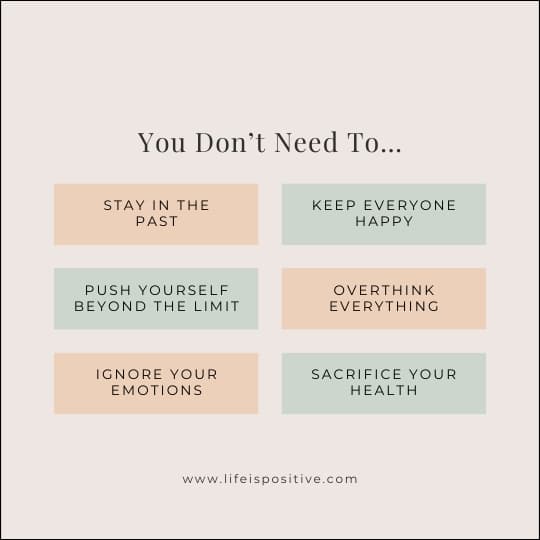|
Getting your Trinity Audio player ready...
|
Ever felt like your own worst enemy, and self-sabotaging behaviour is the sneaky trickster playing multiple roles in your life drama?
You know, that mischievous little gremlin that sometimes whispers in our ears, convincing us to take the scenic route to success via detours through doubt and procrastination.
It’s time to unmask these sneaky sidekicks, rewrite the script, and step into the spotlight of a life that authentically aligns with your true self.
Let’s embrace imperfections, confront challenges head-on, and let go of situations that no longer contribute to our growth and happiness.
Let’s uncover the subtle ways we trip ourselves up and turn the spotlight on a more intentional, fabulous you!
After all, the real hero’s journey is about self-discovery, resilience, and the courage to live a life that feels genuinely fulfilling.
Ready to ditch the unconscious routine and master the art of self-improvement?
20 Self-Sabotage Signs
Navigating the labyrinth of self-sabotaging behaviour is like journeying to decode the hidden messages within our life’s story.
Picture it as cracking secret codes that reveal the patterns holding you back. Let’s break it down into a friendly checklist:
1. Persistent Procrastination: Delaying tasks or avoiding responsibilities on a consistent basis, hindering your progress and goals.
2. Perfectionism Paralysis: Striving for flawlessness to the point where fear of imperfection immobilizes you, preventing you from taking the necessary steps.
3. Comfort Zone Captive: Clinging tightly to your comfort zone, resisting ventures outside it, even when growth opportunities beckon.
4. Negative Self-Talk Maven: Engaging in constant negative self-talk and doubt undermines your confidence and potential for success.
5. People-Pleasing Pitfall: Prioritizing others’ needs at the expense of your own, potentially hindering personal development.
6. Chronic Comparison Syndrome: Continuously measuring your success against others and feeling inadequate as a result.
7. Excuse Artistry: Expertly crafting elaborate excuses to justify avoiding actions or responsibilities.
8. Fear of Failure (or Success): Being paralyzed by the fear of failure or, paradoxically, the fear of success, preventing forward momentum.
9. Overwhelming Overcommitment: Saying ‘yes’ to every request, over-committing, and neglecting your well-being in the process.
10. Intuition Ignored: Disregarding gut feelings or ignoring intuition, particularly when making decisions, hindering alignment with your true desires.
11. Self-Isolation Strategies: Withdrawing from social interactions or avoiding meaningful connections as a way to shield yourself from vulnerability and potential emotional pain.
12. Serial Self-Doubter: Habitually second-guessing your abilities, decisions, or worth, creating a barrier to self-confidence and achievement.
13. Financial Folly: Engaging in impulsive or destructive financial habits, such as overspending or avoiding financial planning, hindering your long-term stability.
14. Health Postponement Tactics: Continuously delaying or neglecting health-related activities, whether it’s exercise, regular check-ups, or healthy habits, impacting your overall well-being.
15. Emotional Eating Escapades: Turning to food as a coping mechanism during stressful times, using it to numb emotions instead of addressing the underlying issues.
16. Avoidance Artistry: Skillfully dodging conversations or situations that may bring discomfort, preventing authentic communication and problem-solving.
17. Unrealistic Goal Setting: Setting unattainable goals or constantly changing your objectives, setting yourself up for failure and discouragement.
18. Skepticism of Success: Undermining your achievements by downplaying them or attributing them solely to external factors, fostering a cycle of self-doubt.
19. Reluctance to Seek Support: Resisting seeking help or guidance from others, maintaining a belief that you must navigate challenges alone, hindering potential growth.
20. Pattern of Self-Pity: Falling into a habit of self-pity, dwelling on perceived misfortunes, and using them as a justification for inaction or lack of progress.
Recognizing this self-sabotaging behaviour sign is key to breaking free. Awareness is the first step to untangling yourself from this intricate web.
Consider this checklist your friendly guide, pointing you toward self-discovery and nudging you to take charge of your own narrative.
After all, your story is waiting for you to be the hero who conquers the challenges and emerges victoriously.
Overcoming Self-Sabotaging Behaviour
Escaping the clutches of this self-sabotage vortex? Think of it as embarking on a heroic quest.
The initial step involves unmasking those seemingly comforting acts for what they truly are—momentary coping mechanisms that, despite their fleeting appeal, are the very mountains blocking your path to progress.
So, tighten the laces on your superhero boots, gear up with self-awareness, and brace yourself for a journey that promises peaks of resilience and valleys of genuine self-discovery.
Unveiling the cloak of self-sabotaging behaviour begins with an honest exploration of your challenges.
Grab that pen and paper, and bravely jot down every single problem. Get specific, be crystal clear, and most importantly, be brutally honest.
Admit what’s truly wrong without sugarcoating it. Lay it all out, raw and unfiltered.
Once you’ve faced the reality on paper, make a pact with yourself—a promise that you won’t accept these challenges as the status quo any longer.
It’s a commitment to your own growth and well-being.
Embrace this exercise as a powerful step toward self-awareness, a declaration that you’re ready to shed the sabotaging behaviors and take charge of your narrative.
You’ve got this!
Final Thoughts
And there you have it, dear reader – the end of our journey through the tangled maze of self-sabotaging behaviour.
As we bid farewell to those sneaky little habits holding us back, let’s not forget the valuable lessons they’ve taught us.
After all, it’s not every day that we get a crash course in the art of unintentional self-sabotage!
So, as you step into the bright future, armed with newfound self-awareness and a determination to kick those self-sabotaging behaviour tendencies to the curb, remember this: Life is too short for unnecessary detours.
Let’s navigate our way to success with a GPS called “Gratitude, Persistence, and a Splash of Humor.” Because let’s face it, laughter is the best medicine, especially when it comes to healing from the self-inflicted wounds of the past.
Here’s to a future filled with self-love, positive choices, and a healthy dose of self-compassion.
Let’s leave self-sabotage in the rearview mirror, shall we?
After all, the road ahead is wide open, and the possibilities are endless.
My friend, the best is yet to come!
Cheers to a self-sabotaging, behaviour-free zone and a life well-lived!
For more empowering content, connect with our vibrant community here ➡️ Social Media.




